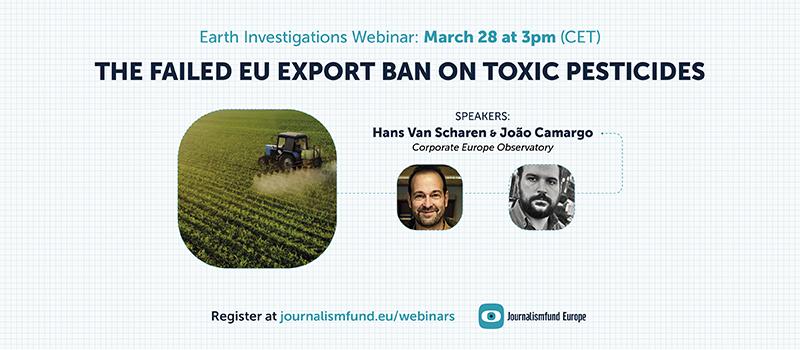WATCH THE RECORDING HERE
In 2018 alone, more than 81,000 tonnes of pesticides containing at least 41 different hazardous chemicals banned for agricultural use in the EU, were exported by European corporations.
Hans van Scharen and Joao Camargo, researchers from the Brussels-based research and campaign organisation ‘Corporate Europe Observatory’, will outline what happened with the announced EU export ban for those pesticides that are outlawed for use in Europe itself.
In October 2020, as part of the EU Green Deal’s 'Chemicals Strategy for Sustainability Towards a Toxic-Free Environment', the European Commission committed to “ensure that hazardous chemicals banned in the European Union are not produced for export, including by amending relevant legislation if and as needed.”
However, the European Commission’s 2023 work program did not include such a much needed legal action to stop this practice of double standards. What seemed to be a non-brainer for the EU to act fast, was silently pushed off the table during the last two years. Many reports and investigations (including this and this among our supported projects – and more are yet to come) confirm that pesticides export continues.
What seemed to be a no-brainer for the EU to act fast, was silently pushed off the table during the last two years. While some officials at the European Commission claim that they are still working on policy-options and a few member states took measures on their own, Low- and middle-income countries like Morocco, South Africa, India, Mexico, Malaysia or Brazil continue to be being flooded with dangerous pesticides banned in the EU; The are highly toxic substances which cannot be safely used and which have devastating impacts on both human health and the environment, resulting in widespread infringement of human rights. Moreover, these countries are among the biggest exporters of agri-food products to the EU and so residues of banned pesticides might be ending up on the dinner plates of EU citizens.
Despite numerous reports by UN rapporteurs, journalists and NGO's, and united protests from hundreds of civil society organisations from across the globe, institutions and trade unions who published a Joint Statement demanding a ban on the export of hazardous chemicals that are forbidden in the EU, the powerful chemical lobby in Europe seems once more to have prevailed.
WATCH THE RECORDING HERE
